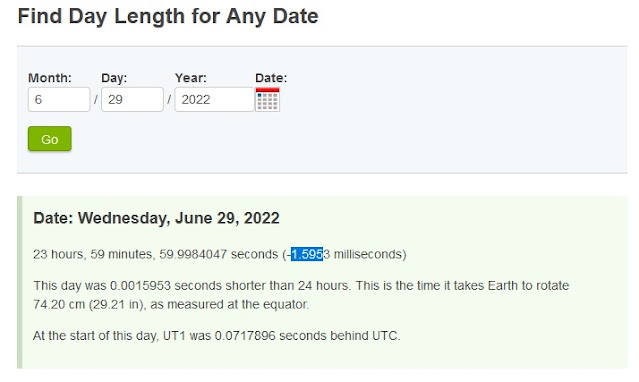If so, you're very sensitive. Wednesday actually was a shorter day, not
in terms of the time from sunrise to sunset but the actual time for the Earth
to rotate a full 360 degrees at the equator. Looked at that way,
it was 1.595 milliseconds shorter than 24 hours
so the day was over that much before it "should have" been. For the
record, the title is a wisecrack. Nobody would notice 1.6
milliseconds. If you're in the US, your lights are flickering 10x slower
than that: every 16.7 milliseconds.

Don't fall into the catastrophic thinking that this means we're headed for
some sort of disaster. The length of days varies all the time.
Since Wednesday, each day has been a little longer, but that trend won't hold
indefinitely. This graphic from the same site shows that the shortest
day in '22 is coming July 26th, and will be around 130 microseconds shorter
than today.
Predictions used for the future, of course. The longest day for this
year so far (and according to the predictions, should remain that) was
Saturday, May 14, the day was 680 microseconds longer than it should have
been.
You may recall leap seconds,
like we had in 2015
on June 30th at midnight, where a second gets added to the clocks because the
days had been consistently too long. How this is done is the clock is
held for one second, typically at the stroke of midnight. When the clock
is at 11:59:59 PM, it holds for one second before showing 12:00:00 AM. In this
case, with days being short, they refer to it (somewhat clumsily, IMO) as
adding a negative leap second. Adding a negative is, of course,
subtracting. The clock would get to 11:59:58 PM and the next tick would
be 12:00:00 AM.
There hasn't been a leap second added since December 31 of 2016, so while some
days have been a bit longer and some have been a bit shorter, the overall
years have been relatively close to the proper number of seconds. If
every day was 1.6 milliseconds too short, a second could be subtracted off the
clock every 625 days. That's not likely.
There has never been a negative leap second
and there's genuine concern that millions of pieces of software in use were
designed without thought of a subtracting a leap second.
Still, the typical day is too fast this year and has been for some years. We might well be heading for the first negative leap second.

My wife wanted to know why I didnt finish her honey do list that day. I told her I lost 1.6 milliseconds and time ran out.
ReplyDeleteWith NTP the sync is not a problem, SiG.
ReplyDeletePlease, I ask respectfully, shaddup about this.
ReplyDeleteI work nights, and the cheap penny-pinching timeclock bastards will figure out a way to start shaving that time off my pay, if anyone wises them up.
Thanks in advance.
It's strange, even though Earth's spin is gradually slowing down, every day seems to go by quicker than the day before :-)
ReplyDelete